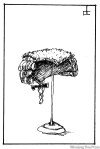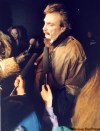Exonerate Unger, Sophonow urges
Says he'll always be linked to teen's death
Advertisement
Read this article for free:
or
Already have an account? Log in here »
To continue reading, please subscribe:
Monthly Digital Subscription
$0 for the first 4 weeks*
- Enjoy unlimited reading on winnipegfreepress.com
- Read the E-Edition, our digital replica newspaper
- Access News Break, our award-winning app
- Play interactive puzzles
*No charge for 4 weeks then price increases to the regular rate of $19.00 plus GST every four weeks. Offer available to new and qualified returning subscribers only. Cancel any time.
Monthly Digital Subscription
$4.75/week*
- Enjoy unlimited reading on winnipegfreepress.com
- Read the E-Edition, our digital replica newspaper
- Access News Break, our award-winning app
- Play interactive puzzles
*Billed as $19 plus GST every four weeks. Cancel any time.
To continue reading, please subscribe:
Add Free Press access to your Brandon Sun subscription for only an additional
$1 for the first 4 weeks*
*Your next subscription payment will increase by $1.00 and you will be charged $16.99 plus GST for four weeks. After four weeks, your payment will increase to $23.99 plus GST every four weeks.
Read unlimited articles for free today:
or
Already have an account? Log in here »
Hey there, time traveller!
This article was published 13/03/2009 (6119 days ago), so information in it may no longer be current.
Kyle Unger should be exonerated of the 1990 murder of Brigitte Grenier, Thomas Sophonow said Thursday.
Sophonow, wrongfully convicted of the 1981 murder of Winnipeg teen Barbara Stoppel, said if Manitoba Justice does not totally absolve Unger of Grenier’s slaying, it will forever link the now 38-year-old man to her death — even if officials decide not to retry him.
"I don’t think the Crown is going to totally exonerate Unger," Sophonow said. "If they do that, there will have to be a judicial inquiry. They don’t want another inquiry. They want all that stuff they want to keep buried to stay buried.

"The only thing that’s important to them is their reputations."
Sophonow also said Manitoba Justice won’t call a public inquiry because it would be too expensive, especially following so closely one looking into how his own case was handled but also the inquiry into how James Driskell’s case was prosecuted.
"The only ones who get rich out of these things are the lawyers," he said.
Sophonow was reacting to Justice Minister Rob Nicholson’s decision Wednesday that Unger should get a new trial as he might be a victim of a miscarriage of justice. It’s now up to the provincial prosecution’s office to decide if a new trial would be in the public interest.
The Crown must also consider if there is a reasonable likelihood of conviction, something which is already in doubt as a hair sample — the only physical evidence supposedly linking Unger to the crime — was discredited by DNA analysis in 2004. That analysis found a hair found on Grenier’s body did not belong to Unger. At Unger’s 1992 trial, James Cadieux, an RCMP hair and fibre expert, said the hair matched microscopically to Unger’s hair. Hair microscopy evidence used in three other high-profile criminal cases in Manitoba has also been rejected after more sophisticated DNA testing was conducted. James Driskell was convicted of killing Perry Dean Harder in 1990 in part on microscopic hair comparison of three hairs found in a van he once owned.
RCMP forensic expert Tod Christianson said at trial those hairs were similar to Harder’s. Later DNA testing found the hairs didn’t belong to Harder, but came from three different people.
Driskell’s conviction was quashed in 2005. Manitoba Justice decided not to order a new trial, and instead entered a stay of proceedings and called a public inquiry. It ended Driskell’s conviction but did not exonerate him.
Sophonow said the Unger case also raises questions about the conduct of now-retired Crown attorney George Dangerfield. Dangerfield also prosecuted Sophonow and Driskell.
At his own inquiry in 2001 into his wrongful conviction — another man who has since committed suicide was identified as the likely killer — Sophonow asked for Dangerfield’s cases to reviewed.
"The answer was, nothing was there," he said.
A similar call was made following the Driskell case, but Manitoba Justice decided the review should be limited only to those cases where non-disclosure was an issue. Cases that hinged on so-called junk science, jailhouse informants, police sting operations or false confessions were excluded.
Tory justice critic Kelvin Goertzen said in the re-examination of these cases, if there is credible reason to believe that any prosecutor repeatedly acted inappropriately, he would not be opposed to a review into their conduct.
"But it is very important to remember that over the past decade the law and how cases are tried has changed significantly," he said. "DNA technology has been developed, the need for full disclosure of evidence has changed and the use of jailhouse informants has changed.
"Any review of how a prosecutor conducted themselves has to be done under the lens of what was considered appropriate at the time, not by current standards and science, which were not in effect or available at the time."
Former Ontario Superior Court Judge Roger Salhany, who has been retained by the province to review Dangerfield’s work, is so far only examining one case, the 1987 first-degree murder conviction of Frank Ostrowski for the killing of a police informant.
At issue is whether a chief Crown witness was given immunity on a cocaine possession charge in exchange for testifying against Ostrowski, and whether that immunity deal was disclosed to Ostrowski’s lawyer.
bruce.owen@freepress.mb.ca
Justice under a cloud
High-profile murder cases handled by now-retired Crown prosecutor George Dangerfield
THOMAS SOPHONOW
Convicted of the 1981 murder of waitress Barbara Stoppel, Sophonow was exonerated in 2000 and compensated following a judicial inquiry into his case in 2001. Evidence at the inquiry showed Dangerfield and other Crown attorneys failed to disclose evidence that would have attacked the credibility of Crown witnesses.
Detectives focused on Sophonow instead of another man, Terry Arnold, who was known to have hung around the murder scene and who had a crush on Stoppel. He has since committed suicide.
Sophonow was awarded $2.6 million in compensation for being wrongfully convicted.
JAMES DRISKELL
Driskell was convicted of the 1990 slaying of Perry Harder. In 2003, he was released from prison on bail after new evidence came forward showing he did not receive a fair trial. That evidence included more than $100,000 in undisclosed payments to witnesses, witness perjury and secret immunity deals.
Former federal justice minister Irwin Cotler found Driskell was wrongly convicted and quashed the conviction in February 2005. Cotler asked Manitoba to hold a new trial, but the province elected to stay the charges.
He was awarded $4 million for spending 13 years behind bars.
KYLE UNGER
A new trial was ordered by federal Justice Minister Rob Nicholson this week. Nicholson said Unger might have been a victim of a miscarriage of justice. Unger is free on bail pending a decision by Manitoba Justice to retry the case. Unger claims he is innocent of the 1990 murder of Brigitte Grenier.
Unger was convicted, in large part, based on hairs found on Grenier’s clothing, which the Crown argued belonged to Unger. DNA tests showed the hairs were not Unger’s. In addition, it has been revealed a jailhouse informant used at the original trial was given consideration on outstanding charges.
FRANK OSTROWSKI
Frank Ostrowski remains in federal prison convicted of a 1986 contract killing of a police informant.
In testimony at the Driskell inquiry, a memo from a federal prosecutor was revealed showing that a secret deal was struck with a key Crown witness to avoid pending criminal charges for cocaine trafficking. The memo suggests federal and provincial Crowns struck a deal to keep the stay a secret until after Ostrowski’s appeal was turned down.
Ostrowski’s case is currently under review.




